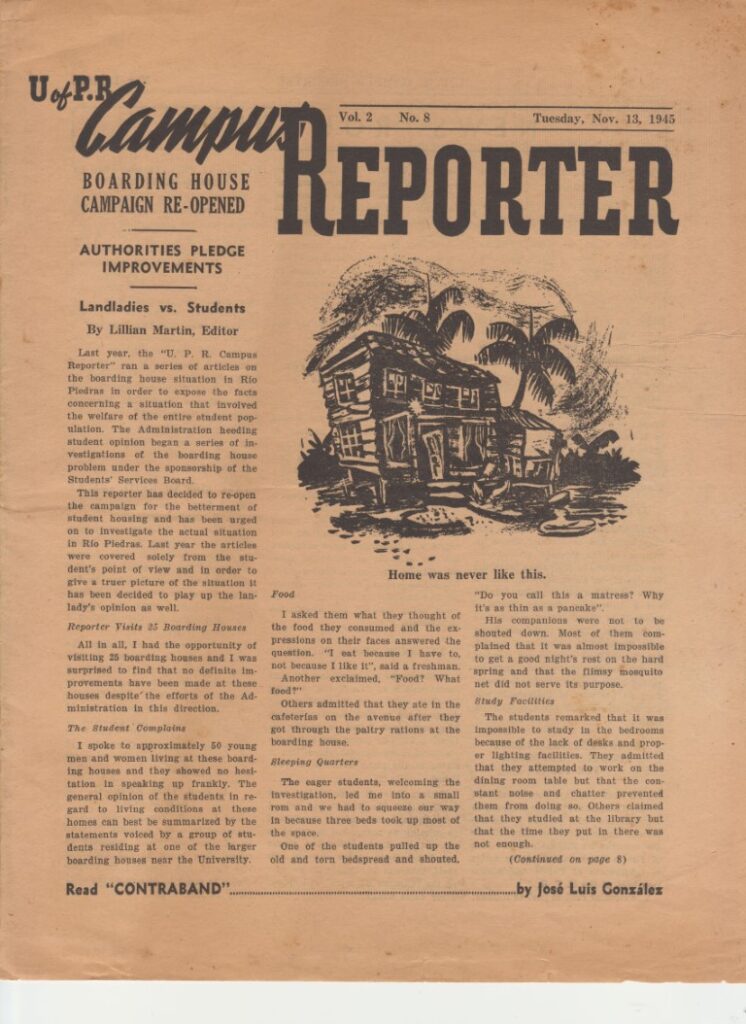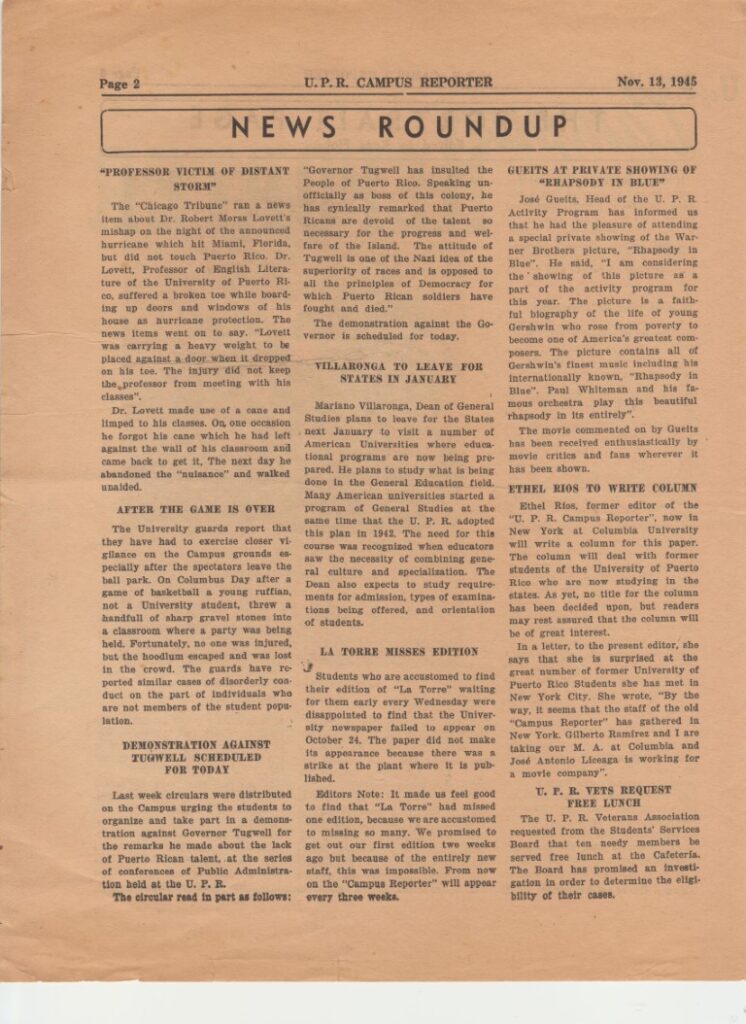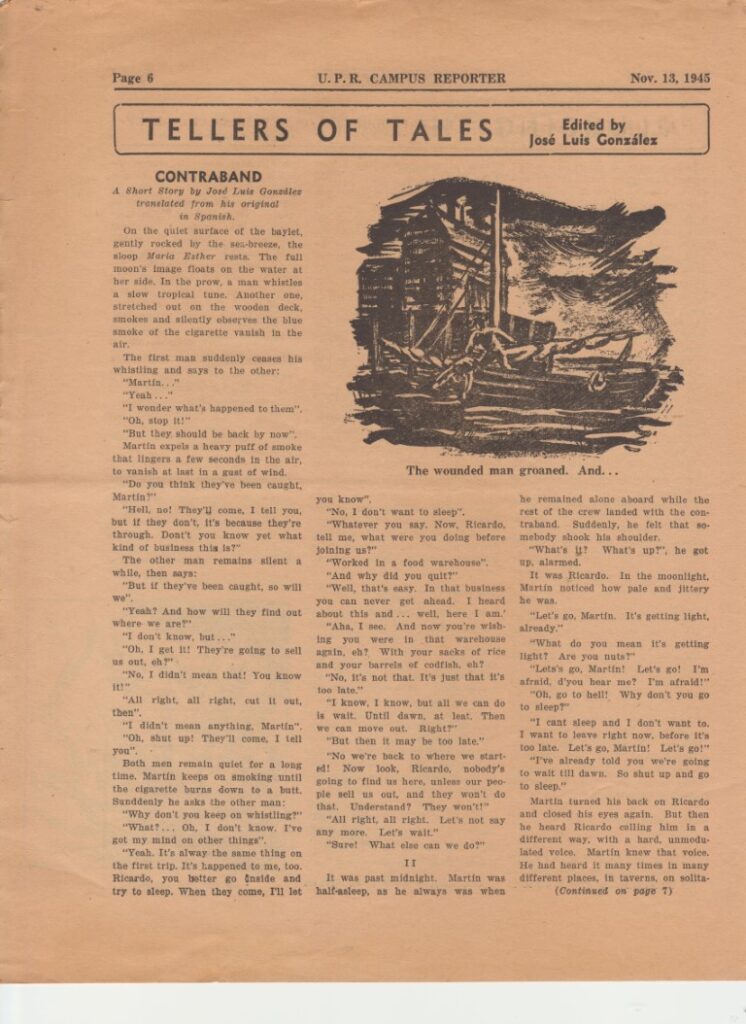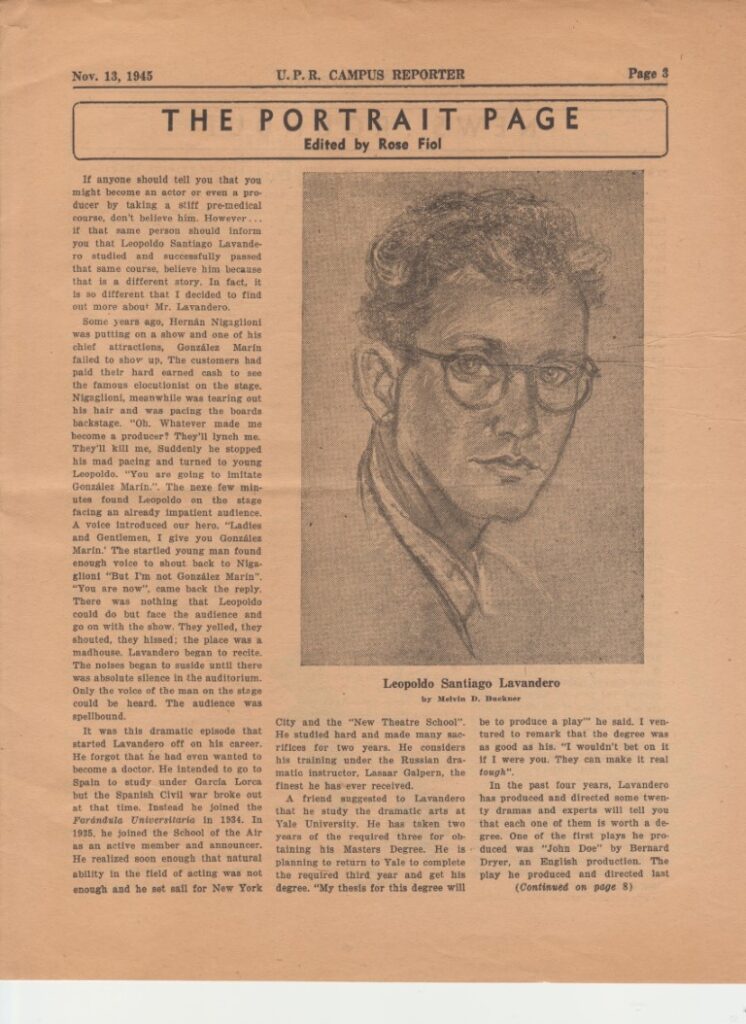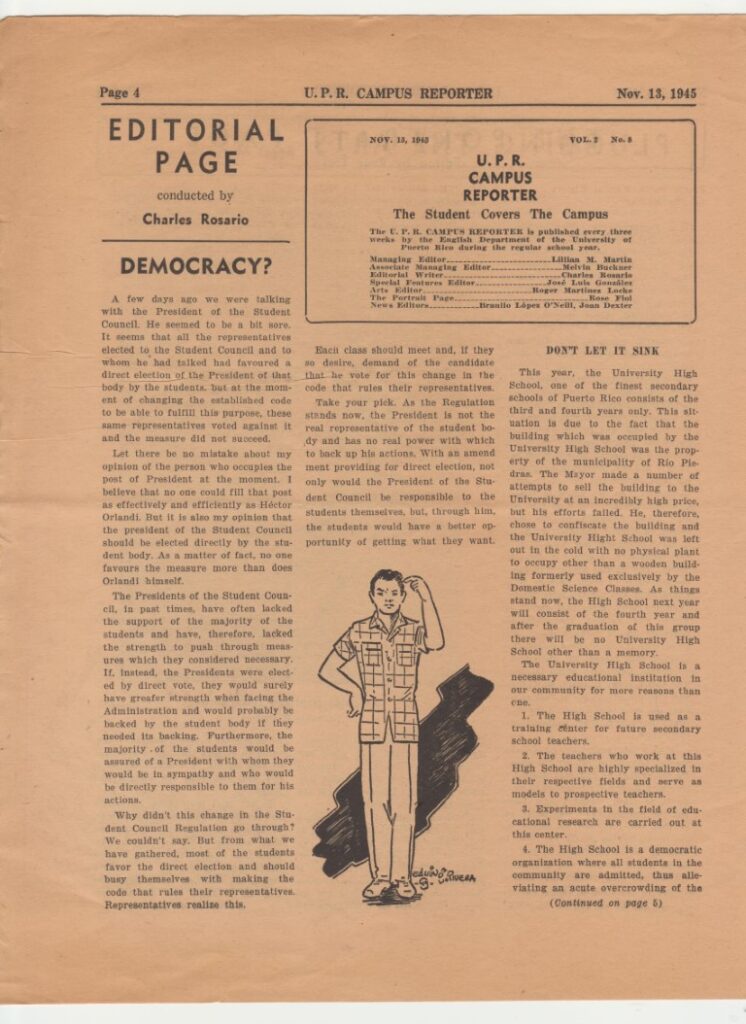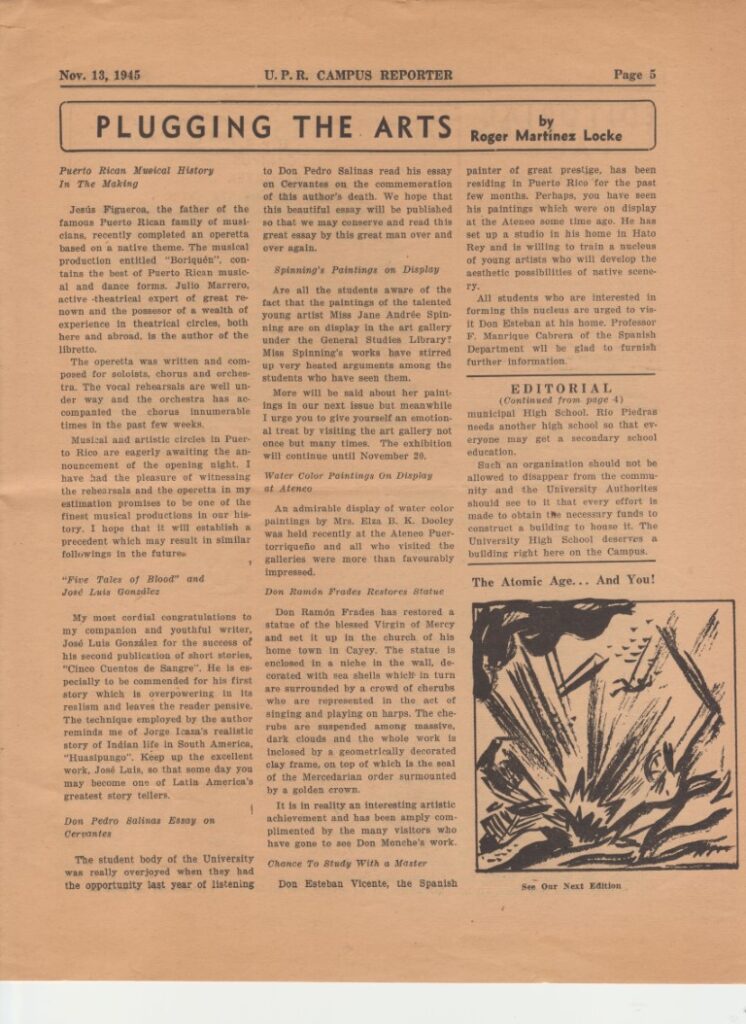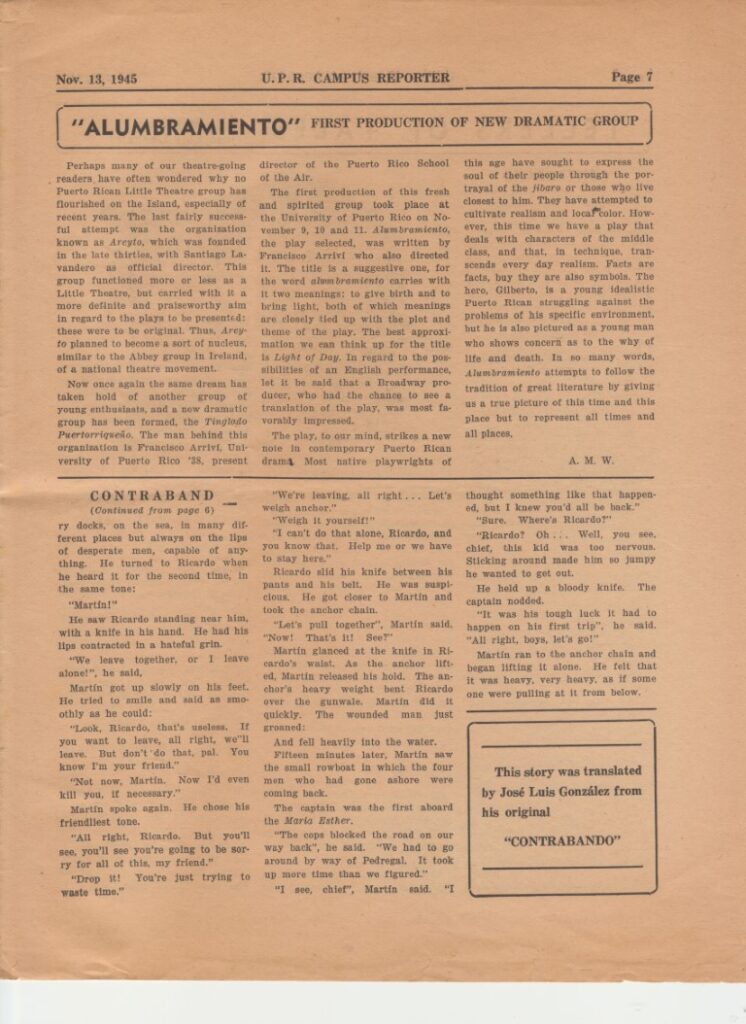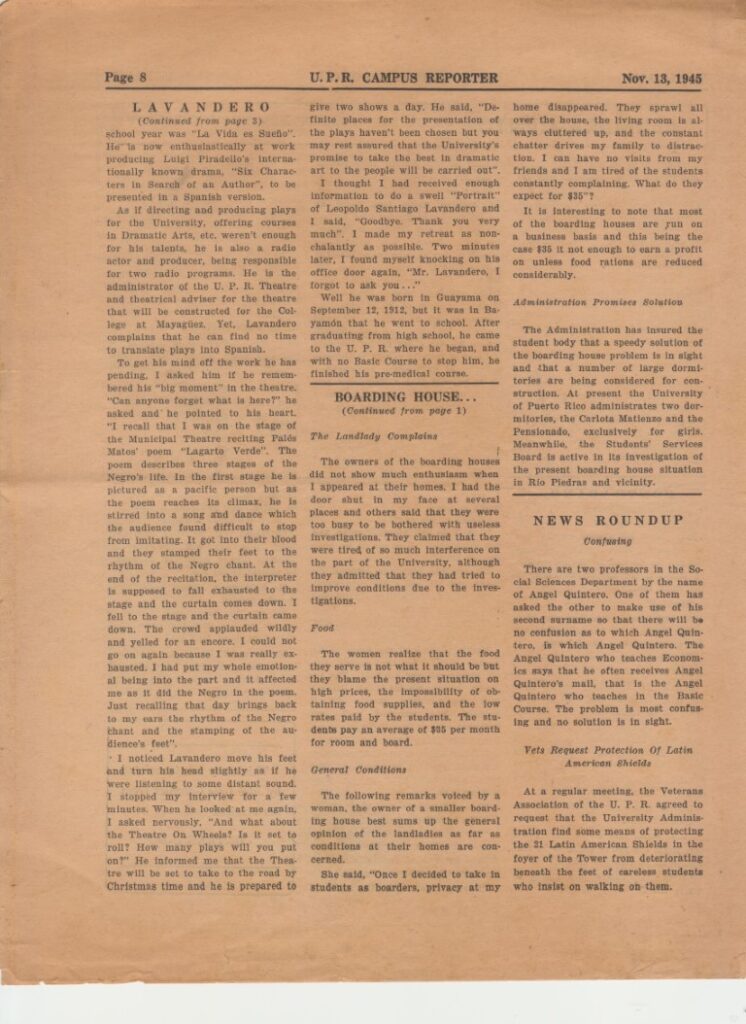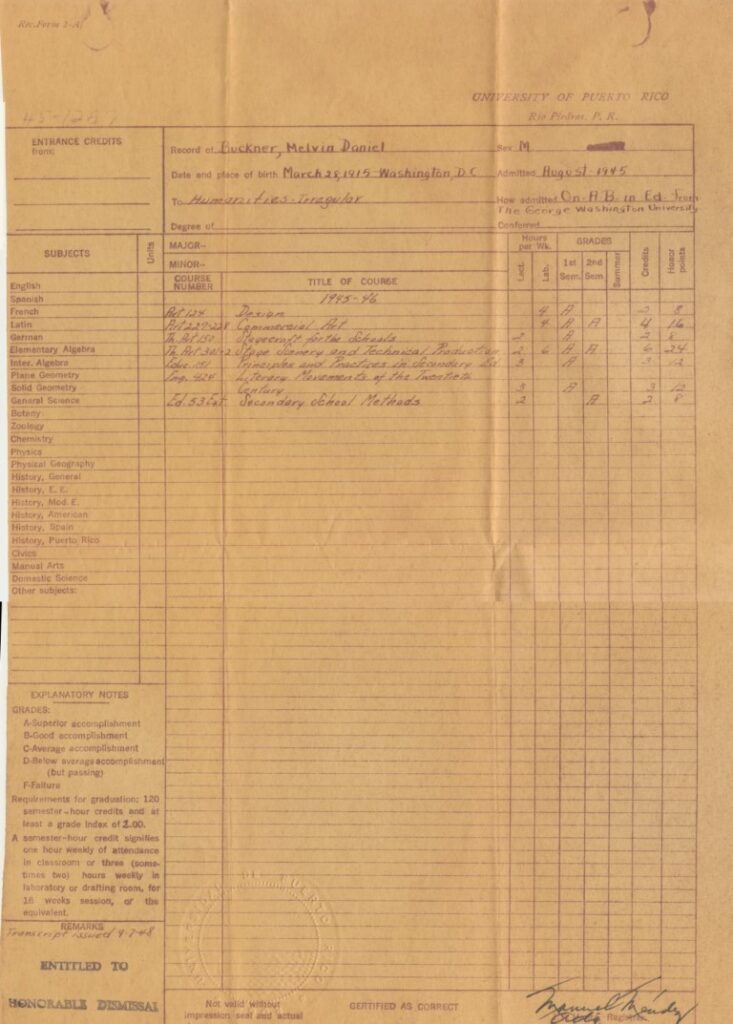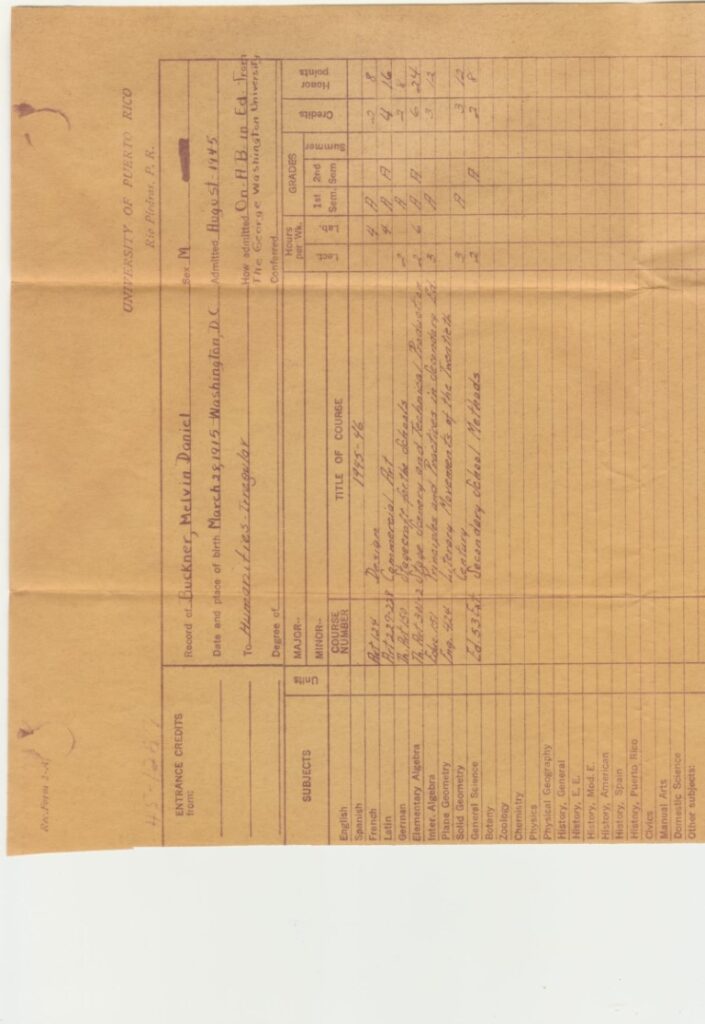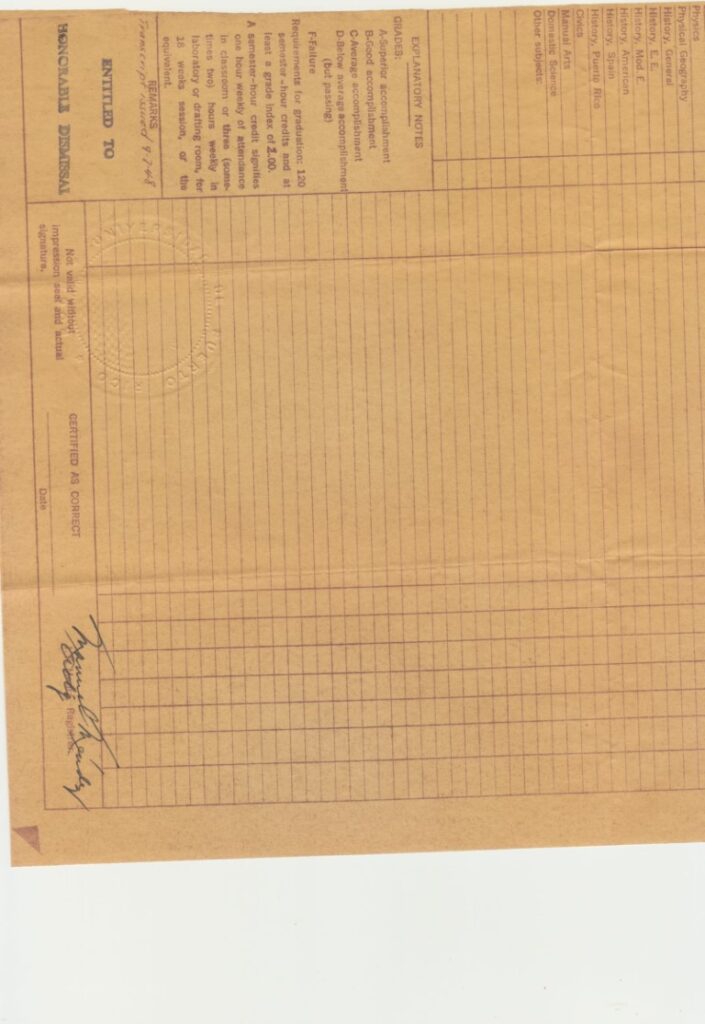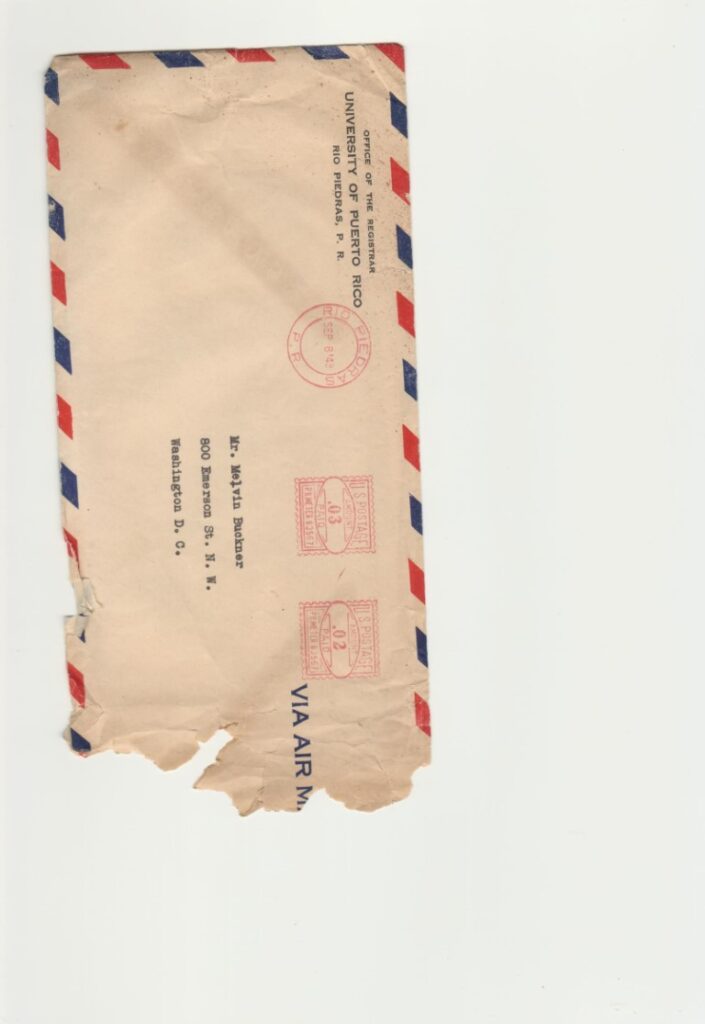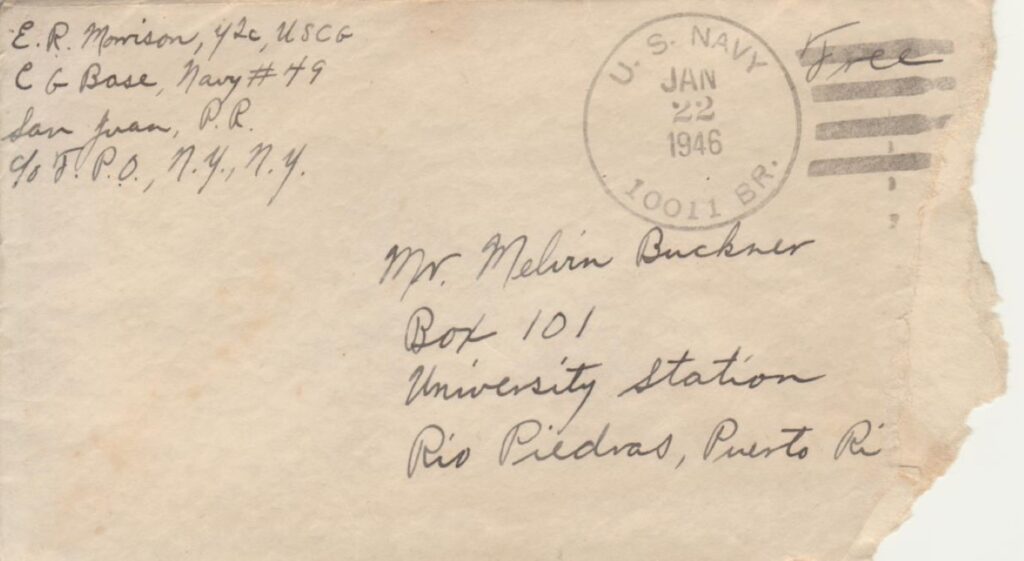Melvin at University
An Observing Eye, A Thoughtful Voice
When Melvin Daniel Buckner began his studies at the University of Puerto Rico in the early 1940s, he carried with him more than textbooks and pencils — he carried questions. The kind of questions that made professors pause, and classmates listen. His was not the loudest voice in the room, but it was the one most carefully measured.
Melvin quickly found his footing in campus life, not through parties or pageantry, but through pages — pages written, edited, and submitted to the U.P.R. Campus Reporter, where his name began appearing regularly beside thoughtful portraits and profiles. He had a keen sense for character, and his writing reflected a quiet fascination with people: what they did, what they believed, what they dared to dream.
His friends remember him as steady and self-contained — someone who didn’t seek attention, but earned respect. While others rushed to chase the latest trend or theatre production, Melvin might be found sitting under the shade of a tree, sketching notes, preparing an article, or reflecting on the latest cultural conversation making waves across the island.
Campus life in wartime Puerto Rico wasn’t easy. There were food shortages, transport delays, and constant political murmurs. But Melvin stayed grounded. He found purpose not only in academics, but in documenting the lives of those around him — fellow students, artists, dramatists — capturing the pulse of a generation straddling tradition and modernity.
He took his editorial responsibilities seriously. Whether interviewing a campus actor, writing about a controversial student council vote, or musing on the future of theatre in Puerto Rican culture, Melvin’s pieces bore the hallmark of someone who listened first — and wrote only when he had something worthwhile to say.
In an age when ambition often outshouted reflection, Melvin’s thoughtful presence was a steadying force. His years at university didn’t just prepare him for a career — they confirmed a calling: to observe, to think, and to write.
University of Puerto Rico Campus Reporter, Vol. 2 No. 8 — November 13, 1945
This is the front page of the U. of P.R. Campus Reporter, dated Tuesday, November 13, 1945, and published as Vol. 2, No. 8. It addresses a serious and widespread student welfare issue at the University of Puerto Rico in Río Piedras: the substandard conditions in student boarding houses.
The headline feature, “Landladies vs. Students”, written by Lillian Martin, the Editor, reveals a renewed campaign following earlier investigations. The article revisits the issue of poor food, sleeping arrangements, and study facilities in private boarding houses that students had to rely on due to limited campus accommodation.
Why is this article important?
- Historical Context: Post-WWII, many universities globally faced housing shortages, especially with returning veterans, displaced students, and institutional underfunding. This document captures student advocacy and the administration’s attempted but insufficient reforms.
- Cultural Insight: It presents a rare, student-led journalistic initiative that puts the voice of the students in direct contrast with the landladies’ narratives, challenging the image of respectable private housing.
- Primary Source: A contemporary record of daily life frustrations, such as poor food, hard bedding, lack of mosquito nets, and inability to study, which shaped the experience of 1940s student life.
- Potential Link to Melvin Daniel Buckner: Given the date (November 1945), location (Río Piedras), and his confirmed presence at the university during this period, it is possible that Buckner either experienced, witnessed, or even contributed to the reporting or campaign — especially considering his educational background and the overlapping timeline.
✍️ FULL TRANSCRIPTION
- of P.R. Campus Reporter
Vol. 2 — No. 8
Tuesday, Nov. 13, 1945
BOARDING HOUSE CAMPAIGN RE-OPENED
AUTHORITIES PLEDGE IMPROVEMENTS
Landladies vs. Students
By Lillian Martin, Editor
Last year, the “U. P. R. Campus Reporter” ran a series of articles on the boarding house situation in Río Piedras in order to expose the facts concerning a situation that involved the welfare of the entire student population. The Administration heeding student opinion began a series of investigations of the boarding house problem under the sponsorship of the Students’ Services Board.
This reporter has decided to reopen the campaign for the betterment of student housing and has been urged on to investigate the actual situation in Río Piedras. Last year the articles were covered solely from the student’s point of view and in order to give a truer picture of the situation it has been decided to play up the landlady’s opinion as well.
Reporter Visits 25 Boarding Houses
All in all, I had the opportunity of visiting 25 boarding houses and I was surprised to find that no definite improvements have been made at these houses despite the efforts of the Administration in this direction.
The Student Complains
I spoke to approximately 50 young men and women living at these boarding houses and they showed no hesitation in speaking up frankly. The general opinion of the students in regard to living conditions at these homes can best be summarized by the statements voiced by a group of students residing at one of the larger boarding houses near the University.
Food
I asked them what they thought of the food they consumed and the expressions on their faces answered the question. “I eat because I have to, not because I like it,” said a freshman.
Another exclaimed, “Food? What food?”
Others admitted that they ate in the cafeterias on the avenue after they got through the paltry rations at the boarding house.
Sleeping Quarters
The eager students, welcoming the investigation, led me into a small room and we had to squeeze our way in because three beds took up most of the space.
One of the students pulled up the old and torn bedspread and shouted,
“Do you call this a mattress? Why it’s as thin as a pancake!”
His companions were not to be shouted down. Most of them complained that it was almost impossible to get a good night’s rest on the hard spring and that the flimsy mosquito net did not serve its purpose.
Study Facilities
The students remarked that it was impossible to study in the bedrooms because of the lack of desks and proper lighting facilities. They admitted that they attempted to work on the dining room table but that the overhead noise and chatter prevented them from doing so. Others said that they studied at the library but that the time they put in there was not enough.
(Continued on page 8)
Read “CONTRABAND” — by José Luis González
- of P.R. Campus Reporter, Page 2 — November 13, 1945
This second page of the U.P.R. Campus Reporter provides a vibrant and varied snapshot of student life, university affairs, political unrest, and cultural developments at the University of Puerto Rico in late 1945. The page is presented under the section titled “News Roundup” and includes short but pointed updates on recent campus happenings.
Here’s what makes this page valuable:
📌 Key Historical Themes:
- Academic Internationalism: Prof. Mariano Villarroga’s planned trip to visit U.S. universities reflects a significant educational shift toward American-style liberal arts education, especially the General Education model.
- Colonial Tensions: The article titled “Demonstration Against Tugwell” reveals growing student political activism and dissatisfaction with Governor Rexford Tugwell, an American appointed official, whose remarks about Puerto Rican capabilities provoked widespread anger.
- Cultural Life: There’s clear enthusiasm for the arts (e.g., a private showing of “Rhapsody in Blue”, a new film about George Gershwin) as part of the university’s Activity Program, suggesting a student body engaged with modern American culture.
- Student Voices: Short segments like “After the Game is Over”, “La Torre Misses Edition”, and “U.P.R. Vets Request Free Lunch” provide a lens into everyday student concerns, frustrations, and requests—covering everything from campus safety and newspaper delivery delays to post-war veterans’ welfare.
- Diaspora Connections: Ethel Ríos writing from Columbia University (New York) shows that former U.P.R. students were active across the diaspora, staying involved with campus affairs and demonstrating cross-continental solidarity.
✍️ FULL TRANSCRIPTION
Page 2 — U.P.R. CAMPUS REPORTER — Nov. 13, 1945
NEWS ROUNDUP
“PROFESSOR VICTIM OF DISTANT STORM”
The “Chicago Tribune” ran a news item about Dr. Robert Morss Lovett’s mishap on the night of the announced hurricane which hit Miami, Florida, but did not touch Puerto Rico. Dr. Lovett, Professor of English Literature at the University of Puerto Rico, suffered a broken toe while boarding up doors and windows of his house as hurricane protection. The news item went on to say, “Lovett was carrying a heavy weight to be placed against a door when it dropped on his toe. The injury did not keep the professor from meeting with his classes.”
Dr. Lovett made use of a cane and limped to his classes. On one occasion he forgot his cane which he had left against the wall of his classroom and came back to get it, The next day he abandoned the “nuisance” and walked unaided.
AFTER THE GAME IS OVER
The University guards report that they have had to exercise closer vigilance on the Campus grounds especially after the spectators leave the ball park. On Columbus Day after a game of baseball a young ruffian, not a University student, threw a handful of sharp gravel stones into a classroom where a party was being held. Fortunately, no one was injured, but the hoodlum escaped and was lost in the crowd. The guards have reported similar cases of disorderly conduct on the part of individuals who are not members of the student population.
DEMONSTRATION AGAINST TUGWELL SCHEDULED FOR TODAY
Last week circulars were distributed on the Campus urging the students to organize and take part in a demonstration against Governor Tugwell for the remarks he made about the lack of Puerto Rican talent, at the series of conferences on Public Administration held at the U.P.R.
The circular read in part as follows:
“Governor Tugwell has insulted the People of Puerto Rico. Speaking unofficially as boss of this colony, he cynically remarked that Puerto Ricans are devoid of the talent so necessary for the progress and welfare of this land. The attitude of Tugwell is one of the Nazi idea of the superiority of races and is opposed to the principles of Democracy for which Puerto Rican soldiers have fought and died.”
The demonstration against the Governor is scheduled for today.
VILLARROGA TO LEAVE FOR STATES IN JANUARY
Mariano Villarroga, Dean of General Studies plans to leave for the States next January to visit a number of American Universities where educational programs are now being prepared. He plans to study what is being done in the General Education field. Many American universities started a program of General Studies at the same time that the U.P.R. adopted this plan in 1942. The need for this course was recognized when educators saw the necessity of combining general culture and specialization. The Dean also expects to study requirements for admissions, types of examinations being offered, and orientation of students.
LA TORRE MISSES EDITION
Students who are accustomed to find their edition of “La Torre” waiting for them early every Wednesday were disappointed to find that the University newspaper failed to appear on October 24. The paper did not make its appearance because there was a strike at the plant where it is published.
Editors Note: It made us feel good to find that “La Torre” had missed one edition, because we are accustomed to missing so many. We promised to get out our first edition two weeks ago but because of the entirely new staff, this was impossible. From now on the “Campus Reporter” will appear every three weeks.
GUESTS AT PRIVATE SHOWING OF “RHAPSODY IN BLUE”
José Guets, Head of the U.P.R. Activity Program has informed us that he had the pleasure of attending a special private showing of the Warner Brothers picture, “Rhapsody in Blue”. He said, “I am considering the showing of this picture as a part of the activity program for this year. The picture is a faithful biography of the life of young Gershwin who rose from poverty to become one of America’s greatest composers. The picture contains all of Gershwin’s finest music including his internationally known, ‘Rhapsody in Blue’. Paul Whiteman and his famous orchestra play this beautiful rhapsody in its entirety.”
The movie commented on by Guets has been received enthusiastically by movie critics and fans wherever it has been shown.
ETHEL RIOS TO WRITE COLUMN
Ethel Rios, former editor of the “U.P.R. Campus Reporter”, now in New York at Columbia University will write a column for this paper. The column will deal with former students of the University of Puerto Rico who are now studying in the States. As yet, no title for the column has been decided upon, but readers may rest assured that the column will be of great interest.
In a letter, to the present editor, she says that she is surprised at the great number of former University of Puerto Rico students she has met in the United States. She wrote, “By the way, it seems that the staff of the old ‘Campus Reporter’ has gathered in New York. Gilberto Ramírez and I are taking over M. A. at Columbia and José Antonio Liceaga is working for a movie company.”
U.P.R. VETS REQUEST FREE LUNCH
The U.P.R. Veterans Association requested from the Students’ Services Board that ten needy members be served free lunch at the Cafeteria. The Board has promised an investigation in order to determine the eligibility of their cases.
Tellers of Tales: “Contraband” (Page 6, U.P.R. Campus Reporter, Nov. 13, 1945)
This page from the University of Puerto Rico Campus Reporter marks a literary shift from journalistic news to short fiction. It features the start of a translated short story titled “Contraband” by José Luis González, a key figure in Puerto Rican literature and political thought. González, who later became known for his explorations of class, identity, and colonialism in Puerto Rican society, here provides a slice of postwar maritime noir.
🔎 Literary Themes & Interpretation:
- Genre & Mood: The story is evocative of film noir or hardboiled maritime tales. Set aboard a small ship, the sloop Maria Esther, under moonlight and coastal breeze, the piece conjures a mood of unease, whispered suspicion, and foreboding tension.
- Characters: Two unnamed men, Martin and Ricardo, are involved in an illegal smuggling operation. Their cryptic dialogue reveals paranoia, distrust, and fear of betrayal, possibly by their unseen crewmates.
- Social Undercurrents: The mention of previous warehouse work, barrels of codfish, and worry about “being sold out” points to working-class struggles, possibly entangled with survival-driven crime in a colonial economy.
- Narrative Tension: The story builds suspense through naturalism (moonlit bay, cigarette smoke) and psychological discomfort, especially Martin’s insomnia and Ricardo’s jittery behavior. The phrase “The wounded man groaned. And…” below the illustration ominously foreshadows consequences.
✍️ FULL TRANSCRIPTION
U.P.R. CAMPUS REPORTER
Nov. 13, 1945
Page 6
TELLERS OF TALES
Edited by José Luis González
CONTRABAND
A Short Story by José Luis González
Translated from his original in Spanish
On the quiet surface of the baylet, gently rocked by the sea-breeze, the sloop Maria Esther rests. The full moon’s image floats on the water at her side. In the prow, a man whistles a slow tropical tune. Another one, stretched out on the wooden deck, smokes and silently observes the blue smoke of the cigarette vanish in the air.
The first man suddenly ceases his whistling and says to the other:
“Martin…”
“Yeah…”
“I wonder what’s happened to them”.
“Oh, stop it!”
“But they should be back by now.”
Martin expels a heavy puff of smoke that lingers a few seconds in the air, to vanish at last in a gust of wind.
“Do you think they’ve been caught, Martin?”
“Hell, no! They’ll come, I tell you. But if they don’t, it’s because they’re through. Don’t you know yet what kind of business this is?”
The other man remains silent a while, then says:
“But if they’ve been caught, so will we.”
“Yeah? And how will they find out where we are?”
“I don’t know, but…”
“Oh, I get it! They’re going to sell us out, eh?”
“No, I didn’t mean that! You know it!”
“All right, all right, cut it out, then.”
“I didn’t mean anything, Martin.”
“Oh, shut up! They’ll come, I tell you.”
Both men remain quiet for a long time. Martin keeps on smoking until the cigarette burns down to a butt. Suddenly he asks the other man:
“Why don’t you keep on whistling?”
“What?… Oh, I don’t know. I’ve got my mind on other things.”
“Yeah, it’s always the same thing on the first trip. It happens to me, too. Ricardo, you better go inside and try to sleep. When they come, I’ll let you know.”
“No, I don’t want to sleep.”
“Whatever you say. Now, Ricardo, tell me, what were you doing before joining us?”
“Worked in a food warehouse.”
“And why did you quit?”
“Well, that’s easy. In that business you can never get ahead. I heard about this and… well, here I am.”
“Aha, I see. And now you’re wishing you were in that warehouse again, eh? With your sacks of rice and your barrels of codfish, eh?”
“No, it’s not that. It’s just that it’s too late.”
“I know, I know, but all we can do is wait. Until dawn, at least. Then we can move out. Right?”
“But then it may be too late.”
“No we’re back to where we started! Now look, Ricardo, nobody’s going to find us here, unless our people sell us out, and they won’t.”
“All right, all right. Let’s not say any more. Let’s wait.”
“Sure! What else can we do?”
It was past midnight. Martin was half-asleep, as he always was when he remained alone aboard while the rest of the crew landed with the contraband. Suddenly, he felt that somebody shook his shoulder.
“What’s it? What’s up?”, he got up, alarmed.
It was Ricardo. In the moonlight, Martin noticed how pale and jittery he was.
“Let’s go, Martin. It’s getting light, already.”
“What do you mean it’s getting light? Are you nuts?”
“Let’s go, Martin! Let’s go! I’m afraid, d’you hear me? I’m afraid!”
“Oh, go to hell! Why don’t you go to sleep?”
“I can’t sleep and I don’t want to. I want to leave right now, before it’s too late. Let’s go, Martin! Let’s go!”
“You’re already told we’re going to wait till dawn. So shut up and go to sleep.”
Martin turned his back on Ricardo and closed his eyes again. But then he heard Ricardo calling him in a different way, with a hard, unmodulated voice. Martin knew that voice. He had heard it many times in many different places, in taverns, on solita—
(Continued on page 7)
Portrait Feature: Leopoldo Santiago Lavandero (Page 3, U.P.R. Campus Reporter, Nov. 13, 1945)
This page is a biographical portrait written by Melvin D. Buckner, under the editorial guidance of Rose Fiol, profiling Leopoldo Santiago Lavandero — a young man whose accidental debut as an actor turned into a full-fledged career in theatre. The article, part of The Portrait Page series, combines storytelling with reportage, describing Lavandero’s transformation from pre-medical student to aspiring playwright and director.
🔎 Thematic Insight:
- Unexpected Origins: Lavandero’s career in theatre began with an emergency fill-in performance, mimicking an absent actor, González Marín. The spontaneity and audience reaction propelled him onto a new path.
- Cultural Crossroads: Lavandero initially wanted to study in Spain, but the Spanish Civil War disrupted his plans. He instead pursued his calling in the United States, specifically New York City and later Yale University.
- Mentorship & Training: The text highlights the role of the Russian dramatist Lasaar Galpern as Lavandero’s most influential teacher, and the rigorous training he undertook at Yale to become a credible theatre artist.
- Colonial Aspiration vs. Authentic Craft: Despite achieving a near-complete education, Lavandero humbly notes that his “thesis” must be to successfully produce a play, not just to receive a degree — emphasizing practical artistry over academic credentials.
✍️ FULL TRANSCRIPTION
U.P.R. CAMPUS REPORTER
Nov. 13, 1945
Page 3
THE PORTRAIT PAGE
Edited by Rose Fiol
If anyone should tell you that you might become an actor or even a producer by taking a stiff pre-medical course, don’t believe him. However… if that same person should inform you that Leopoldo Santiago Lavandero studied and successfully passed that same course, believe him because that is a different story. In fact, it is so different that I decided to find out more about Mr. Lavandero.
Some years ago, Hernán Nigaglioni was putting on a show and one of his chief attractions, González Marín, failed to show up. The customers had paid their hard earned cash to see the famous elocutionist on the stage. Nigaglioni, meanwhile was tearing out his hair and was pacing the boards backstage. “Oh. Whatever made me become a producer? They’ll lynch me. They’ll kill me.” Suddenly he stopped his mad pacing and turned to young Leopoldo. “You are going to imitate González Marín”. The next few minutes found Leopoldo on the stage facing an angry, impatient audience. A voice introduced our hero, “Ladies and Gentlemen, I give you González Marín.” The startled young man found enough voice to shout back to Nigaglioni “But I’m not González Marín.” “You are now”, came back the reply. There was nothing that Leopoldo could do but face the audience and go on with the show. They yelled, they shouted, they hissed; the place was a madhouse. Lavandero began to recite. The noises began to subside until there was absolute silence in the auditorium. Only the voice of the man on the stage could be heard. The audience was spellbound.
It was this dramatic episode that started Lavandero off on his career. He forgot that he had even wanted to become a doctor. He intended to go to Spain to study under García Lorca but the Spanish Civil War broke out at that time. Instead he joined the Farándula Universitaria in 1934. In 1935, he joined the School of Theater as an active member and announcer. He realized soon enough that natural ability in the field of acting was not enough and he set sail for New York City and the “New Theatre School.” He studied hard and made many sacrifices for two years. He considers his training under the Russian dramatic instructor, Lasaar Galpern, the finest he has ever received.
A friend suggested to Lavandero that he study the dramatic arts at Yale University. He has taken two years of the required three for obtaining his Masters Degree. He is planning to return to Yale to complete the required third year and get his degree. “My thesis for this degree will be to produce a play” he said. I ventured to remark that the degree was as good as his. “I wouldn’t bet on it if I were you. They can make it real tough.”
In the past four years, Lavandero has produced and directed some twenty dramas and experts will tell you that each one of them is worth a degree. One of the first plays he produced was “John Doe” by Bernard Dryer, an English production. The play he produced and directed last
.P.R. Campus Reporter – Editorial and Policy Commentary
Page 4 – November 13, 1945
This page of the U.P.R. Campus Reporter features two major components:
🧠 Section 1: Editorial — “DEMOCRACY?”
By Charles Rosario
This editorial discusses the democratic structure and representation within the University of Puerto Rico’s Student Council, sparked by a failed attempt to alter its election regulations. At issue is the lack of direct student body elections for the position of President of the Student Council, which leads to a disconnect between leadership and the student body.
Key arguments:
- The current President (Héctor Orlandi) is viewed as efficient, yet not directly elected by the students.
- Elected representatives voted against reform that would allow for direct election, despite previously indicating support.
- Without direct elections, Presidents lack authority and student backing, reducing their power when negotiating with University administration.
- The piece calls for greater student agency and urges student representatives to take charge of writing a new code for representation.
🏫 Section 2: “DON’T LET IT SINK”
A passionate appeal regarding the University High School — one of Puerto Rico’s premier secondary institutions — which is facing closure or relocation due to lack of proper facilities. The municipality of Río Piedras had proposed to sell the school’s building to the university, but the mayor’s efforts failed, and the building was instead confiscated. Now, the High School is left to occupy a less suitable structure.
Key points:
- The High School is essential for training future teachers and conducting educational research.
- It is one of the few democratic institutions where students from various backgrounds are admitted.
- Its closure would result in a significant loss to Puerto Rico’s educational ecosystem.
This article continues on the next page.
✍️ FULL TRANSCRIPTION
Page 4
U.P.R. CAMPUS REPORTER
Nov. 13, 1945
EDITORIAL PAGE
Conducted by Charles Rosario
DEMOCRACY?
A few days ago we were talking with the President of the Student Council. He seemed to be a bit sore. It seems that all the representatives elected to the Student Council and to whom he had talked had favored a direct election of the President of that body by the students, but at the moment of changing the established code to be able to fulfill this purpose, these same representatives voted against it and the measure did not succeed.
Let there be no mistake about my opinion of the person who occupies the post of President at the moment. I believe that no one could fill that post as effectively and efficiently as Héctor Orlandi. But it is also my opinion that the president of the Student Council should be elected directly by the student body. As a matter of fact, no one favours the measure more than does Orlandi himself.
The Presidents of the Student Council, in past times, have often lacked the support of the majority of the students and have, therefore, lacked the strength to push through measures which they considered necessary. If, instead, the Presidents were elected by direct vote, they would surely have greater strength when facing the Administration and would probably be backed by the student body if they needed its backing. Furthermore, the majority of the students would be assured of a President with whom they would be in sympathy and who would be directly responsible to them for his actions.
Why didn’t this change in the Student Council Regulation go through? We couldn’t say. But from what we have gathered, most of the students favor the direct election and should busy themselves with making the code that rules their representatives. Representatives, realize this.
DON’T LET IT SINK
This year, the University High School, one of the finest secondary schools of Puerto Rico consists of the third and fourth years only. This situation is due to the fact that the building which was occupied by the University High School was the property of the municipality of Río Piedras. The Mayor made a number of attempts to sell the building to the University at an incredibly high price, but his efforts failed. Later, he chose to confiscate the building and the University High School was left out in the cold with no physical plant to occupy other than a wooden building formerly used exclusively by the Domestic Science Classes. As things stand now, the High School next year will consist of the fourth year and after the graduation of this group there will be no University High School other than a memory.
The University High School is a necessary educational institution in our community for more reasons than one.
- The High School is used as a training center for future secondary school teachers.
- The teachers who work at this High School are highly specialized in their respective fields and serve as models to prospective teachers.
- Experiments in the field of educational research are carried out at this center.
- The High School is a democratic organization where all students in the community are admitted, thus alleviating an acute overcrowding of the
U.P.R. Campus Reporter
Page 5 – November 13, 1945
This page contains three sections of particular value:
🎨 SECTION 1: “PLUGGING THE ARTS”
By Roger Martínez Locke
A beautifully diverse arts column that captures:
- Puerto Rican musical development, particularly through Jesús Figueroa’s operetta Borinquén, which weaves local musical traditions into theatrical form.
- Literary success of José Luis González, celebrating his growing prominence as an emerging Latin American short story writer.
- Art on campus, including:
- Paintings by Jane André-Spinning on display at the General Studies Library.
- Watercolours by Elza B.K. Dooley displayed at Ateneo Puertorriqueño.
- Restoration of a religious statue by Don Ramón Frades in the town of Cayey.
- An opportunity to study under Don Esteban Vicente, a prestigious Spanish painter currently in Puerto Rico.
Together, these brief updates signal a vibrant, modernising cultural atmosphere at the University of Puerto Rico in the immediate postwar years. Artistic production is framed as both educational and spiritually enriching.
🏫 SECTION 2: Continuation of the Editorial – “DON’T LET IT SINK”
This is a continuation from Page 4, concerning the possible closure of University High School due to lack of a permanent facility. The editorial argues persuasively for its retention by emphasising:
- The role of the school in preventing overcrowding.
- Its integrated, democratic admission policy.
- Its impact on future teacher training, research, and secondary education access.
The editorial closes with a call to the University Authorities to prioritise this issue and secure a building on campus.
⚠️ SECTION 3: “The Atomic Age… And You!”
This teaser illustration (showing an atomic explosion) is likely a preview for the next issue. Its inclusion subtly signals the post-WWII anxieties emerging in student discourse in 1945, only three months after the bombings of Hiroshima and Nagasaki.
✍️ FULL TRANSCRIPTION
U.P.R. CAMPUS REPORTER
Page 5 – Nov. 13, 1945
PLUGGING THE ARTS
by Roger Martínez Locke
Puerto Rican Musical History In the Making
Jesús Figueroa, the father of the famous Puerto Rican family of musicians, recently completed an operetta based on a native theme. The musical production entitled “Borinquén,” contains the best of Puerto Rican musical and dance forms. Julio Marrero, active theatrical expert of great reknown and the possessor of a wealth of experience in theatrical circles, both here and abroad, is the author of the libretto.
The operetta was written and composed for soloists, chorus and orchestra. The vocal rehearsals are well under way and the orchestra has accompanied the chorus innumerable times in the past few weeks.
Musical and artistic circles in Puerto Rico are eagerly awaiting the announcement of the opening night. I have had the pleasure of witnessing the rehearsals and the operetta in my personal impression is to be one of the finest musical productions in our history. I hope that it will establish a precedent which may result in similar followings in the future.
“Five Tales of Blood” and José Luis González
My most cordial congratulations to my companion and youthful writer, José Luis González for the success of his second publication of short stories, “Cinco Cuentos de Sangre”. He is especially to be commended for his first story which is overpowering in its realism and leaves the reader pensive. The technique employed by the author reminds me of Jorge Icaza’s realistic story of Indian life in South America, “Huasipungo”. Keep up the excellent work, José Luis, so that some day you may become one of Latin America’s greatest story tellers.
Don Pedro Salinas Essay on Cervantes
The student body of the University was really overjoyed when they had the opportunity last year of listening to Don Pedro Salinas read his essay on Cervantes on the commemoration of this author’s death. We hope that this beautiful essay will be published so that we may conserve and read this great essay by this great man over and over again.
Spinning’s Paintings on Display
Are all the students aware of the fact that the paintings of the talented young artist Miss Jane André-Spinning are on display in the art gallery under the General Studies Library? Miss Spinning’s works have stirred up very heated arguments among the students who have seen them.
More will be said about her paintings in our next issue but meanwhile I urge you to give yourself an emotional treat by visiting the art gallery not once but many times. The exhibition will continue until November 20.
Water Color Paintings On Display at Ateneo
An admirable display of water color paintings by Mrs. Elza B. K. Dooley was held recently at the Ateneo Puertorriqueño and all who visited the galleries were more than favourably impressed.
Don Ramón Frades Restores Statue
Don Ramón Frades has restored a statue of the blessed Virgin of Mercy and set it up in the church of his home town in Cayey. The statue is enclosed in a niche in the wall, decorated with sea shells which in turn are surrounded by a crowd of cherubs who are represented in the act of singing and playing on harps. The cherubs are suspended among massive, dark clouds and the whole work is enclosed by a geometrically decorated clay frame, on top of which is the seal of the Mercadearian order surrounded by a golden crown.
It is in reality an interesting artistic achievement and has been amply complimented by the many visitors who have gone to see Don Moncho’s work.
Chance To Study With a Master
Don Esteban Vicente, the Spanish painter of great prestige, has been residing in Puerto Rico for the past few months. Perhaps, you have seen his paintings which were on display at the Ateneo some time ago. He has set up a studio in his home in Hato Rey and is allowing a small nucleus of young artists who will develop the aesthetic possibilities of native scenery.
All students who are interested in forming this nucleus are urged to visit Don Esteban at his home. Professor F. Manrique Cabrera of the Spanish Department will be glad to furnish further information.
EDITORIAL
(Continued from page 4)
…municipal High School. Río Piedras needs another high school so that everyone may get a secondary school education.
Such an organization should not be allowed to disappear from the community and the University Authorities should see to it that every effort is made to find the necessary funds to erect a building to house it. The University High School deserves a building right here on the Campus.
The Atomic Age… And You!
(Illustration of an atomic explosion)
See Our Next Edition
U.P.R. Campus Reporter
Page 7 – November 13, 1945
This page showcases two standout contributions:
🎭 1. “ALUMBRAMIENTO” – A New Chapter in Puerto Rican Theatre
This article announces the first production of the new dramatic group Tríptico Puertorriqueño, an initiative by University of Puerto Rico alumnus Francisco Arriví (class of 1938), who was also director of the Puerto Rico School of the Air.
The play, Alumbramiento (“Birth” or “Awakening”), debuted November 9–11, 1945, and was written and directed by Arriví himself. It was:
- Symbolic and socially charged – The play’s title reflects both literal birth and a metaphorical awakening.
- Deeply Puerto Rican – Unlike earlier plays, which mimicked European forms or focused on the jíbaro (rural peasant), this play tackled modern urban life, Puerto Rican identity, and existential questions of life and death.
- Influenced by realism – Yet still framed within literary artistry and symbolic resonance.
- Compared favourably to Broadway-level theatre – A visiting director remarked positively after seeing an English version.
This column situates Alumbramiento as a landmark moment in the evolution of original Puerto Rican drama, aligned with a broader cultural self-definition following WWII.
🧾 2. “CONTRABAND” — Short Fiction Translated by José Luis González
This is the concluding segment of the short story Contrabando, begun on Page 6. Authored and translated by José Luis González, it offers a tense narrative of betrayal and escape involving two desperate men: Martin and Ricardo.
In this final section:
- Ricardo is determined to leave — even threatening Martin with a knife.
- Martin tries to stay calm, pleading for patience, but ultimately overpowers Ricardo and pushes him overboard.
- Ricardo is fatally wounded and sinks. His body is never recovered.
- Martin returns to the María Esther boat and explains what happened, but downplays the events.
- The captain finds a bloody knife, realising Ricardo panicked on his first smuggling trip.
The story ends with Martin silently noting the emotional and physical weight of what just occurred.
It is gritty, economical storytelling, and likely draws from real-life maritime or post-war smuggling realities around Puerto Rico or the Caribbean. It demonstrates González’s flair for stark realism.
✍️ FULL TRANSCRIPTION
U.P.R. CAMPUS REPORTER
Page 7 – Nov. 13, 1945
“ALUMBRAMIENTO” – FIRST PRODUCTION OF NEW DRAMATIC GROUP
Perhaps many of our theatre-going readers have often wondered why no Puerto Rican Little Theatre group has flourished on the Island, especially of recent years. The last fairly successful attempt was the organization known as Areyto, which was founded in the late thirties, with Santiago Lavandero as official director. This group functioned more or less as a Little Theatre, but carried with it a more definite and praiseworthy aim in regard to the plays to be presented: these were to be original. Thus, Areyto planned to become a sort of nucleus, similar to the Abbey group in Ireland, of a national theatre movement.
Now once again the same dream has taken hold of another group of young enthusiasts, and a new dramatic group has been formed, the Tríptico Puertorriqueño. The man behind this organization is Francisco Arriví, University of Puerto Rico ’38, present director of the Puerto Rico School of the Air.
The first production of this fresh and spirited group took place at the University of Puerto Rico on November 9, 10 and 11. Alumbramiento, the play selected, was written by Francisco Arriví who also directed it. The title is a suggestive one, for the word alumbramiento carries with it two meanings: to give birth and to bring light, both of which meanings are closely tied up with the plot and theme of the play. The best approximation we can think up for the title is Light of Day. In regard to the possibilities of an English performance, the director said that a Broadway producer, who had the chance to see a translation of the play, was most favorably impressed.
The play, on our mind, strikes a new note in contemporary Puerto Rican drama. Most native playwrights of this age have sought to express the soul of their people through the portrayal of the jíbaro or those who live closest to him. They have attempted to cultivate realism and local color. However, this time we have a play that deals with characters of the working class and that, in technique, transcends every day realism. Facts are facts, but they are also symbols. The hero, Gilberto, is a young idealistic Puerto Rican struggling against the problems of his specific environment, but he is also pictured as a young man who shows concern as to the why of life and death. In so many words, Alumbramiento attempts to follow the tradition of great literature by giving us a true picture of this time and this place but to represent all times and all places.
—A.M.W.
“CONTRABAND”
(Continued from page 6)
…ry docks, on the sea, in many different places but always on the lips of desperate men, capable of anything. He turned to Ricardo when he heard it for the second time, in the same tone:
“Martín!”
He saw Ricardo standing near him, with a knife in his hand. He had his lips contracted in a hateful grin.
“We leave together, or I leave alone!”, he said.
Martín got up slowly on his feet. He tried to smile and said as smoothly as he could:
“Look, Ricardo, that’s useless. If you want to leave, all right, we’ll leave. But don’t do that, pal. You know I’m your friend.”
“Not now, Martín. Now I’d even kill you, if necessary.”
Martín spoke again. He chose his friendliest tone.
“All right, Ricardo. But you’ll see, you’ll see you’re going to be sorry for all of this, my friend.”
“Drop it! You’re just trying to waste time.”
“We’re leaving, all right… Let’s weigh anchor.”
“Weigh it yourself!”
“I can’t do that alone, Ricardo, and you know that. Help me or we have to stay here.”
Ricardo slid his knife between his pants and his belt. He was suspicious. He got closer to Martín and took the anchor chain.
“Let’s pull together,” Martín said. “Now! That’s it! See?”
Martín glanced at the knife in Ricardo’s waist. As the anchor lifted, Martín released his hold. The anchor’s heavy weight bent Ricardo over the gunwale. Martín did it quickly. The wounded man just groaned:
And fell heavily into the water.
Fifteen minutes later, Martín saw the small rowboat in which the four men who had gone ashore were coming back.
The captain was the first aboard the María Esther.
“The cops blocked the road on our way back,” he said. “We had to go around by way of Pedregal. It took up more time than we figured.”
“I see, chief,” Martín said. “I thought something like that happened, but I knew you’d all be back.”
“Sure. Where’s Ricardo?”
“Ricardo? Oh… Well, you see, chief, this kid was too nervous. Sticking around made him so jumpy he wanted to get out.”
He held up a bloody knife. The captain nodded.
“It was his tough luck it had to happen on his first trip,” he said. “All right, boys, let’s go!”
Martín ran to hoist the chain and began lifting it alone. He felt that it was heavy, very heavy, as if someone were pulling at it from below.
This story was translated by José Luis González from his original “CONTRABANDO”
U.P.R. Campus Reporter
Page 8 – November 13, 1945
This final page of the issue continues multiple previously started features and closes with brief but telling snippets of campus and cultural life. It reveals postwar student frustrations, housing inadequacies, vibrant cultural pursuits, and bureaucratic confusion.
🎭 1. LAVANDERO (Continued from Page 3)
This section is a continuation of a feature on Leopoldo Santiago Lavandero, a major figure in Puerto Rican theatre. It delves deeper into:
- His influence on the U.P.R. Theatre, including original productions and translations.
- His personal “big moment” as a performer: enacting Pales Matos’ poem “Lagarto Verde” about the three stages of the Negro’s life—an emotionally exhausting performance that left a lasting impression.
- Plans for a travelling theatre group, “The Theatre on Wheels,” set to begin touring by Christmas.
- Lavandero’s biographical background: born in Guayama, educated in Bayamón and at U.P.R., where he began a pre-med course before switching to the arts.
The portrait concludes warmly, showing a passionate artist and teacher whose influence blends cultural pride, education, and social realism.
🏚️ 2. BOARDING HOUSE (Continued from Page 1)
The investigation into substandard student housing reaches its climax with first-hand testimonies:
- The landlady’s perspective: frustrated with students, tired of university interference, and skeptical of investigations.
- Students’ complaints: poor food, lack of privacy, low-quality furnishings, noise, high prices.
- It’s noted that most boarding houses are run as side businesses and resist improvements unless food prices are reduced or incentives introduced.
There’s hope, though—the university administration promises that new dormitories for women (Carlota Matienzo and the Pensionado) are under construction. The Students’ Services Board continues investigations into the Río Piedras housing situation.
📰 3. NEWS ROUNDUP
Three snippets highlight quirks and concerns of student life:
- Name confusion in the Social Sciences Department:
- Two professors named Angel Quintero, both at U.P.R.
- One teaches Economics, the other Basic Course.
- Students are confused and the administration has no clear solution.
- Veterans ask for floor protection:
- The Veterans Association requests that the university protect the Latin American Shields in the foyer from being damaged by careless students stepping on them.
✍️ FULL TRANSCRIPTION
U.P.R. CAMPUS REPORTER
Page 8 – Nov. 13, 1945
LAVANDERO
(Continued from page 3)
…school year was “La Vida es Sueño.” He is now enthusiastically at work producing Luigi Pirandello’s internationally known drama, “Six Characters in Search of an Author,” to be presented in a Spanish version.
As if directing and producing plays for the University, offering courses in Dramatic Arts, etc. weren’t enough to fill his tables, he is also a noted actor and producer, being responsible for two radio programs. He is the administrator of the U.P.R. Theatre and theatrical advisor for the theatre that will be constructed for the College at Mayagüez. Yet, Lavandero complains that he can find no time to translate plays into Spanish.
To get his mind off the work he has pending, I asked him if he remembered his “big moment” in the theatre.
“Can anyone forget what is here?” he asked and he pointed to his heart. “I recall that I was on the stage of the Municipal Theatre reciting Pales Matos’ poem “Lagarto Verde”. The poem describes three stages of the Negro’s life. In the first stage he pictured life as a pacific person but as the poem reaches its climax, he is stirred into a song and dance which the audience found difficult to stop from imitating. It got into their blood and they stamped their feet to the rhythm of the Negro chant. At the end of the recitation, the interpreter is supposed to fall exhausted to the stage and the curtain comes down. I fell to the stage and the curtain came down. The crowd applauded wildly and yelled for an encore. I could not go on again because I was really exhausted. I had put my whole emotional being into the part and it affected me as it did the Negro in the poem. Just recalling that day brings back to my ears the rhythm of the Negro chant and the stamping of the audience’s feet.”
I noticed Lavandero move his feet and turn his head slightly as if he were listening to some distant sound.
I stopped my interview for a few minutes. When he looked at me again, I asked nervously, “And what about the Theatre on Wheels? Is it set to roll? How many plays will you put on?” He informed me that the Theatre will be set to take to the road by Christmas time and he is prepared to give two shows a day. He said, “Decide the places for the presentation of the plays haven’t been chosen but you may rest assured that the University is to take the best in dramatic art to the people will be carried out!”
I thought I had received enough information to do a swell “Portrait” of Leopoldo Santiago Lavandero and I said, “Goodbye. Thank you very much.” I made my retreat as nonchalantly as possible. Two minutes later, I found myself knocking on his office door again, “Mr. Lavandero, I forgot to ask you … ”
Well he was born in Guayama on September 12, 1912, but it was in Bayamón that he went to school. After graduating from high school, he came to the U. of P. R. where he began, and with no Basic Course to stop him, he finished his pre-medical course.
BOARDING HOUSE…
(Continued from Page 1)
The Landlady Complains
The owners of the boarding houses did not show much enthusiasm when I appeared at their homes. I had the door shut in my face at several places and others said that they were too busy to be bothered with useless investigations. They claimed that they were tired of so much interference on the part of the University, although they admitted that they had tried to improve conditions due to the investigations.
Food
The women realize that the food they serve is not what it should be but they blame the present situation on high prices, the impossibility of obtaining food supplies, and the low rates paid by the students. The students pay an average of $35 per month for room and board.
General Conditions
The following remarks voiced by a woman, the owner of a smaller boarding house best sums up the general opinion of the landladies as far as conditions at their homes are concerned:
She said, “Once I decided to take in students as boarders, privacy at my home disappeared. They sprawl all over the house, the living room is always cluttered up, and the constant charter drives my family to distraction. I can have no visits from my friends and I am tired of the students constantly complaining. What do they expect for $35?”
It is interesting to note that most of the boarding houses are run on a business basis and this being the case the landladies do not wish to lose money unless food rations are reduced considerably.
Administration Promises Solution
The Administration has insured the student body that a speedy solution of the boarding house problem is in sight and that a number of large dormitories are being considered for construction. At present the University of Puerto Rico administrates two dormitories, the Carlota Matienzo and the Pensionado, exclusively for girls.
Meanwhile, the Students’ Services Board is active in its investigation of the present boarding house situation in Río Piedras and vicinity.
NEWS ROUNDUP
Confusing
There are two professors in the Social Sciences Department by the name of Angel Quintero. One of them has asked the authorities to allow him to use a second surname so that there will be no confusion as to which Angel Quintero, is which Angel Quintero. The Angel Quintero who teaches Economics says that the often receives Angel Quintero’s mail, that is the Angel Quintero who teaches in the Basic Course. The problem is most confusing and no solution is in sight.
Vets Request Protection of Latin American Shields
At a regular meeting, the Veterans Association of the U.P.R. agreed to request that the University Administration find some means of protecting the 21 Latin American Shields in the foyer of the Tower from deteriorating beneath the feet of careless students who insist on walking on them.
Melvin Daniel Buckner’s Academic Record, University of Puerto Rico (1945–46)
This is an official academic transcript from the University of Puerto Rico, Rio Piedras campus, documenting the coursework of Melvin Daniel Buckner, born March 28, 1915 in Washington, D.C., during the 1945–1946 academic year. He was admitted to a Humanities – Irregular program in August 1945, following previous studies at The George Washington University, where he earned an A.B. in Education.
The transcript includes:
- Course titles, numbers, units, and hours per week
- Grades for both semesters
- Total semester hours and grade points
- Certified signature from the university registrar
- A note of “Entitled to Honorable Dismissal”
This record reflects:
- A postgraduate-level continuation of teacher training and educational development, likely for certification or professional qualification.
- Focus on pedagogy, technical production, drawing, and chemistry instruction methods, aligning with a future in secondary education or arts education.
- Performance was consistently “B” (Good accomplishment) across all subjects, showing stable academic capability.
This document is also significant for family history and education/migration context — indicating that Melvin Buckner, though born in Washington, D.C., pursued teaching certification in Puerto Rico, possibly due to job placement, military service, or specific educational programs offered there post-WWII.
🖋️ FULL TRANSCRIPTION
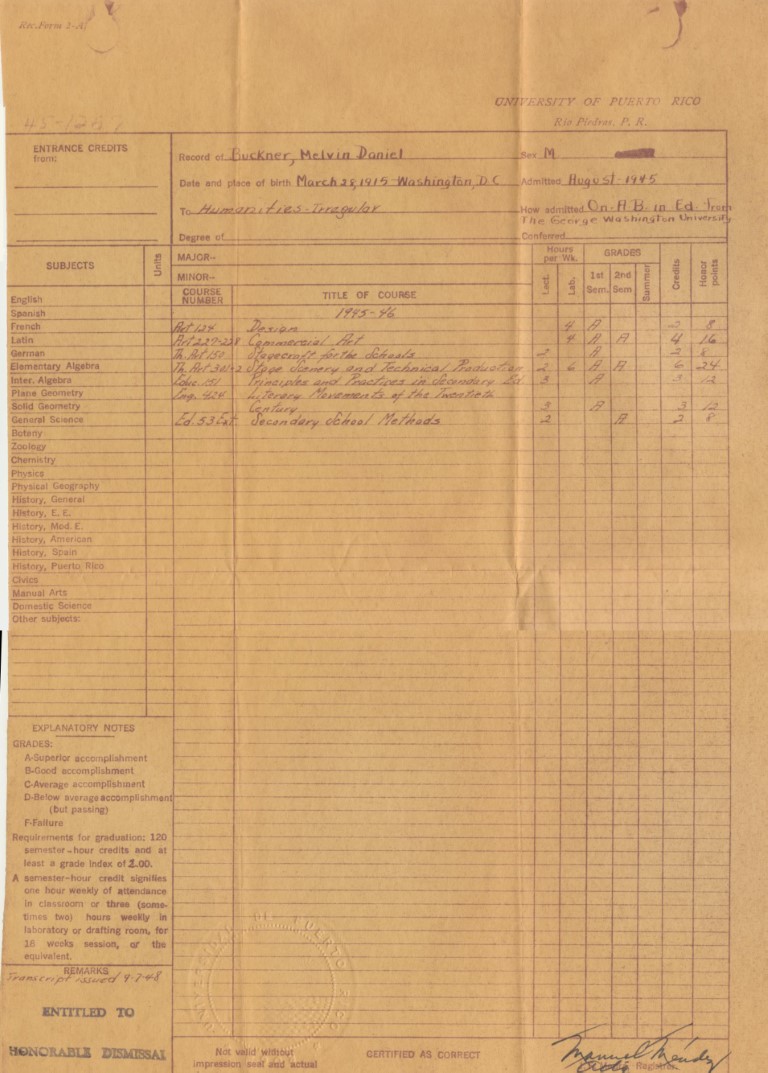 University of Puerto Rico
University of Puerto Rico
Rio Piedras, P.R.
(Rev. Form 2-A)
(Stamped: 45-1267)
Record of: Buckner, Melvin Daniel
Sex: M
Date and Place of Birth: March 28, 1915 – Washington, D.C.
Admitted: August 1945
To: Humanities – Irregular
How admitted: On A.B. in Ed. from The George Washington University
Degree conferred: (none listed)
🧾 COURSE RECORD (1945–46)
| Subject | Course No. | Title of Course | Hours per Wk | Grades (1st Sem / 2nd Sem) | Semester Hours | Grade Points |
| Art | Art 121 | Design | 4 | B / B | 4 | 16 |
| Art | Art 122 | Commercial Art | 4 | B / B | 4 | 16 |
| Education | Ed. 413-20 | Supervising State Schools | 2 | B | 2 | 8 |
| Education | Ed. 515 | Stage Scenery and Technical Production | 6 | B | 6 | 24 |
| Education | Ed. 611 | Principles and Practices in Chemistry Instr. | 3 | B | 3 | 12 |
| Chemistry | Chem. 442 | Elementary Movements of the Instructor | 3 | B | 3 | 12 |
| Education | Ed. 533-E | Secondary School Methods | 2 | B | 2 | 8 |
📌 EXPLANATORY NOTES:
GRADES:
- A – Superior accomplishment
- B – Good accomplishment
- C – Average accomplishment
- D – Below average accomplishment (but passing)
- F – Failure
Requirements for graduation:
- 120 semester-hour credits
- Grade index of at least 2.00
A semester-hour credit signifies one hour weekly attendance in classroom or three (sometimes two) hours weekly in lab/drafting room for 18 weeks, or equivalent.
REMARKS:
Transcript issued 9-7-46
🔹 ENTITLED TO HONORABLE DISMISSAL
(Embossed seal of the University of Puerto Rico)
CERTIFIED AS CORRECT
(Signed): [Manuel (?) Chaves], Registrar

